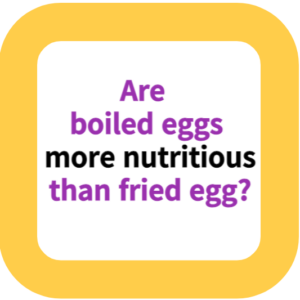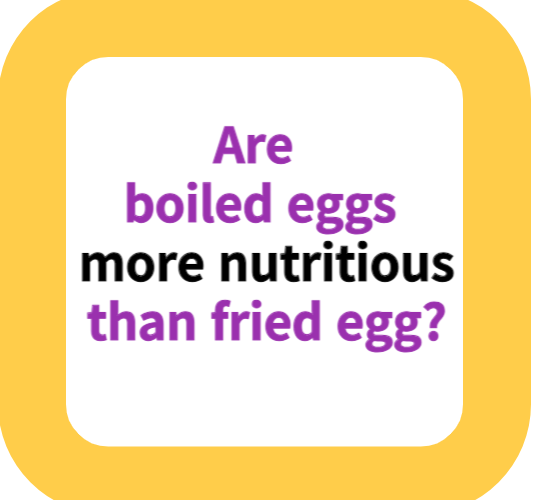Are boiled eggs more nutritious than fried egg?
Welcome to our latest blog post where we delve into the nutritious world of eggs, a staple in many diets across the globe. In this post, we explore the subtle yet significant differences between boiled and fried eggs, shedding light on how each cooking method impacts their nutritional value.
From discussing protein content and fat types to examining cholesterol levels and protein bioavailability, we provide a comprehensive analysis that caters to health-conscious individuals and culinary enthusiasts alike.
Whether you’re an egg aficionado or simply looking to make informed dietary choices, our post offers valuable insights into making healthier decisions without compromising on taste. Join us as we crack open the facts and unravel the nutritional nuances of boiled versus fried eggs!
Are boiled eggs more nutritious than fried egg?

Introduction: The Versatility and Nutrition of Eggs
Eggs are a fundamental element in various cuisines worldwide, valued for their high-quality protein, vitamins, and minerals. They can be prepared in numerous ways, including boiling, frying, scrambling, and poaching, each method contributing differently to their nutritional profile.
Understanding these differences is crucial for those who regularly include eggs in their diet and are mindful of their nutritional intake.

Nutritional Differences: Boiled vs. Fried Eggs
When comparing boiled and fried eggs, the primary difference lies in the cooking process. Boiled eggs are cooked in water, making them lower in calories and fat, as they don’t require additional fats for cooking. On the other hand, fried eggs are typically prepared with oil or butter, increasing their calorie and fat content.
Despite these differences, both boiled and fried eggs are outstanding sources of protein, with a large boiled egg providing around 6 grams, and a fried egg offering approximately 5 grams. This high protein content is essential for muscle building, skin health, and hair and nail maintenance.
Fat Content: A Closer Look
The fat content in eggs varies significantly between boiling and frying. Fried eggs have a higher total and saturated fat content due to the cooking process, with a large fried egg containing about 5 grams of fat compared to around 4 grams in a boiled egg. Eggs contain a mix of saturated and unsaturated fats, the latter of which can be beneficial for health in moderate amounts.
Vitamins, Minerals, and Cholesterol
Boiled and fried eggs are similar in their vitamin and mineral composition, both being excellent sources of vitamins B12 and D, as well as minerals like iron, zinc, and selenium. However, fried eggs tend to have a higher cholesterol content, which was traditionally thought to impact heart health negatively.
Recent studies suggest that dietary cholesterol may not significantly affect blood cholesterol levels, with saturated and trans fats being more concerning.
Protein Bioavailability: Boiled vs. Fried
The bioavailability of protein in egg whites increases significantly upon cooking. Cooked egg whites, which change from clear and runny to white and firm, have about 90% bioavailability, surpassing other protein sources like meat, dairy, or soy.
In contrast, the protein in uncooked, runny egg whites is less bioavailable, with only about 60% absorption. Hard-boiled eggs, therefore, provide more digestible protein due to their thorough cooking.
Cooking Methods and Protein Quality
Achieving the perfect fried egg, with no runny parts yet without overcooking, is a culinary challenge. Protein that is overly heated and browns is less bioavailable, and some compounds in burnt protein might be detrimental to health.
Boiling provides a more controlled and consistent cooking temperature, ensuring that the egg is cooked just right for optimal protein absorption without the risk of overcooking.
Conclusion: Making the Healthier Choice
In summary, both boiled and fried eggs offer substantial nutritional benefits, rich in protein, essential vitamins, and minerals. The choice between them should consider individual health concerns like cholesterol and fat intake. Boiled eggs have a slight nutritional advantage due to their lower calorie and fat content and higher protein bioavailability.
However, the method of preparation should align with personal dietary goals and preferences. Whether boiled or fried, eggs remain a nutritious and versatile food choice in a balanced diet.
